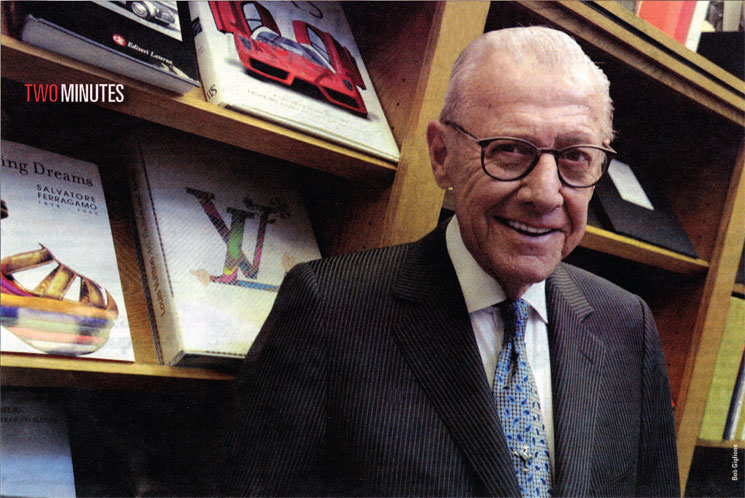Frank Castagna gives high-end shoppers what they want
As the owner of two of Long Island’s premier places to shop, Frank Castagna has made a huge mark on the area’s retail landscape.
The son of a successful general contractor, Castagna began building the Americana shopping center in Manhasset in 1955 and it since has bec6me an internationally recognized destination for luxury shopping. Castagna Realty also helped build North Shore University Hospital, New York City police department headquarters and the Nassau Veterans Memorial Coliseum.
But while his legacy lies with the Americana and the Wheatley Plaza in Greenvale, Castagna’s charity work may be his most lasting contribution.
Awarded an honorary doctorate degree in humane letters from Long Island University, Castagna serves on the board of directors of Old Westbury Gardens, Honors College at Hofstra University and the American Jewish Committee. Last week the Sid Jacobson JCC honored Castagna for making the community a better place to live, work and play.
Castagna lives in Brookville with his wife, Rita, and (surprise) they do most of their shopping at the Americana and Wheatley Plaza.
Since you got your start, what has changed in the retail real estate industry on Long Island?
The biggest change has been the three generations. In the early 1950s when I started, returning vets were anxious to start families and get back to work. Then we have the baby boomer of today coming into senior citizenship and then we’re all looking at today’s teenagers to see where they’re heading and trying to anticipate that.
In the early 1950s, people shopped for more of the basics, clothing for the family. The baby boomers started earlier and had more education. They had a different attitude. Baby boomers reflected a more prosperous era, so their ability to shop changed.
Now today’s younger generation is completely computer literate and more aware of fashion than any generation in the past. They’re well aware of marketing and advertising and brand building.
You really have to differentiate your product.
What has stayed the same?
The one thing that’s constant is knowing who your customer is; that doesn’t change. The customer changes, but you still have to know exactly who your potential customer is. Also being aware of what their requirements are in terms of brands is ·still important.
Has the higher-end retail business been hurt badly by the recession?
Yes. It got hurt very early on maybe somewhat before some of the other industries, but it also recovered faster and is showing stronger growth, faster than the rest of the economy. It got hit in the early stages primarily because they came off good years and bought accordingly. Then September 2008 came about and the market collapsed, and they were all caught with tremendous inventory and took terrific losses. Afterward they adjusted to the market. The luxury market and the affluence that fuels it responded very quickly. Once they felt secure and comfortable about shopping again, they came out.
Did you have to help tenants out during the latest economic downturn?
We made concessions in the sense that we looked at those costs we’re sharing with the tenants and asked, ‘How do we reduce those costs?’ We reduced their burden in terms of common area maintenance, advertising and marketing. We did our best to cut back on that. A few smaller tenants we did offer some help, but major brands didn’t need any assistance.
When there’s so much competition, how do you get shoppers to come out and spend money at your centers?
We try to create an experience when you come here. The restaurants, the mix of shops, the parking, the security and overall ambience, that’s all part of the shopping experience.
Will shopping online ever make a sizeable dent in the number of customers who shop at your stores?
At the present time there is some impact, but it’s not really measurable. Everyone is worried about what might happen 10,15 or 20 years from now. So far it hasn’t taken away, it’s just supported the lines that the stores carry.
What’s the best advice you could give a young retail developer?
Know how to differentiate whatever you’re going to do. You can’t go head on into a market without knowing that market really well. You have to be unique and you have to know how to market. Marketing today is more important than ever.
Are you optimistic about the future of retail?
I think so. Long Island has a lot to offer in terms of education and recreation and its proximity to the city. Put all those things together and you have a very strong reason, why shouldn’t you bet on Long Island!
– DAVID WINZELBERG

